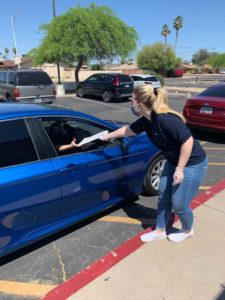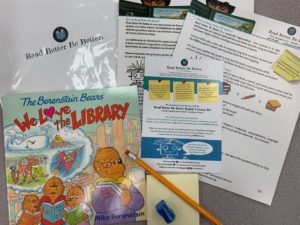FOR IMMEDIATE RELEASE
June 19, 2020
PHOENIX, AZ. – A Phoenix-based 501c3, Read Better Be Better (RBBB) was awarded grants from The Alison Lewis & Craig Krumwiede Family Foundation and The Burton Family Foundation through the Arizona COVID-19 Community Response Fund (ACF), as well as grants from the Microsoft DCCD COVID-19 Response Funds Phoenix and VSUW – United for the Valley COVID-19 Fund for the creation and distribution of Family Literacy Kits.
RBBB partners struggling 3rd grade Readers with at-risk 6th-8th grade mentor Leaders to meet twice a week for 10 weeks and work through structured curriculum to improve reading comprehension, concentration, and the enjoyment of reading.
To prevent reading regression during the COVID-19 school closures, RBBB created and distributed Family Literacy Kits for all 2nd and 3rd graders at partner schools. The kits were handed out when families arrived at school for meal pickup, and RBBB was able to distribute 4,590 Family Literacy Kits to 51 schools in 10 districts over the course of 6 days throughout May of 2020.

RBBB Site Leader safely distributes a Family Literacy Kit.
Until all schools were closed statewide mid-March, RBBB was serving 953 students in 10 districts at 44 Title 1 schools across Maricopa and Pinal counties, including the cities of El Mirage, Goodyear, Avondale, Surprise, Buckeye, and Glendale. Because of the school closures, RBBB had to suspend in-person programming for the Spring 2020 semester.
In addition to students missing classroom instruction and the normalcy and routine that school offers, students were no longer receiving the essential one-on-one reading time with their mentor partners that RBBB provides. On average, the 3rd graders in RBBB’s program improve 60% on their reading comprehension exams after one 20-session semester.
Many schools offered online resources during this time; however, this does not mean that all students have equal access to digital materials. According to a 2019 study by Microsoft, nearly half of Americans do not have internet services in their homes. Furthermore, in low-income homes—the community that RBBB serves—this number is even higher.
The consequence of this digital divide is a doubling of the “summer slide” effect. Even for families with internet at home, many caregivers are using computers to work remotely, taking precedence over online schooling for their kids. This means that the students RBBB serves could lose up to 40% of their gains in reading during this crisis.
The students served by RBBB programming, none of whom are reading on grade-level when they begin, cannot afford to regress in their learning, which can lead to long-lasting effects in terms of their prospects of graduating from high school, going to college, and finding sustainable employment.
With school instruction on hiatus and a deep digital divide, RBBB saw the need to do something to prevent the loss of these gains during quarantine.
Public-private partnerships like the ones formed between RBBB and ACF, Microsoft, and VSUW are critical in times of economic hardship and adversity, such as the current COVID-19 global pandemic. These partnerships allowed the distribution of RBBB’s Family Literacy Kits to 100% of the schools currently being served that are offering meal pickup, allowing educational achievement to continue, youth development and empowerment to increase, interpersonal connections between caregivers and children to develop, and alleviating the stress put onto caregivers during this time of isolation.

The contents of an RBBB Family Literacy Kit.
The Family Literacy Kits contained easy-to-use curriculum guides, reading resource sheets, storybooks, sticky notes, and a pencil and sharpener, all in a tote. The curriculum guides provide clear instructions to help caregivers assist their children in gaining reading comprehension skills and can be used for any available reading material in the home, from cereal boxes to comic books, as well as subject textbooks and homework sheets that have been sent from school.
“We already know how important literacy is to lifelong success,” said Sophie Etchart, Founder and CEO. “For those children who have been isolated at home, with limited libraries and preoccupied parents, our programming has become more critical than ever. It was imperative that we develop modified implementation strategies as soon as possible to mitigate learning loss.”
“It is such a privilege to work with partners who are prepared to stand with us in times of greater need – everyone came together to do what needed to be done in the moment,” said Etchart.
For more information about Read Better Be Better, visit www.readbetterbebetter.org.
###
Contact:
Katie Herrick
Communications Coordinator
Katie@ReadBetterBeBetter.org
Direct: (623) 404-6030
